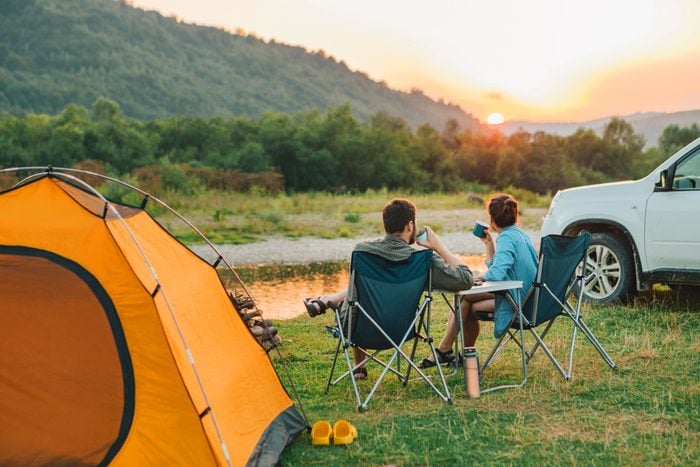
Happy campers
Just because camping is all about the great outdoors doesn’t mean you can leave your manners at home. Yes, it’s a decidedly casual vacation (or way of life, depending on how you look at it), but there are still some general unwritten rules everyone should follow. Well-meaning beginning campers and seasoned ones alike may think they’re doing the right thing, or the generous thing, but in reality, the behavior may be annoying fellow campers, or worse, putting mother nature at risk.
Camping has skyrocketed in popularity over the past few years as a result of the pandemic, which had travelers looking for a way to vacation in wide open spaces. For years, I’ve relished my time in the woods, free camping far away from civilization, where I’ve had to hike several miles to my campsite with all my food and belongings. I’ve also enjoyed luxury camping, where I just showed up, plopped down and enjoyed all the on-site amenities. For me, camping is the best way to be one with nature, and it’s been a wonderful way for my friends and me to hang out and bond together without being sucked into our smartphones. As much as I love having the woods to myself, I’m thrilled to see so many new campers out there, and I wholeheartedly hope the trend continues. First-time campers and those new to the woods, we welcome you to the outdoors and hope you spend as much time here as possible.
But more people means it’s more important than ever to avoid these rude habits—even ones that may seemingly be polite—when camping. I’ve spoken with other campers and outdoors experts for advice on some common habits to stop doing, and what to do instead.
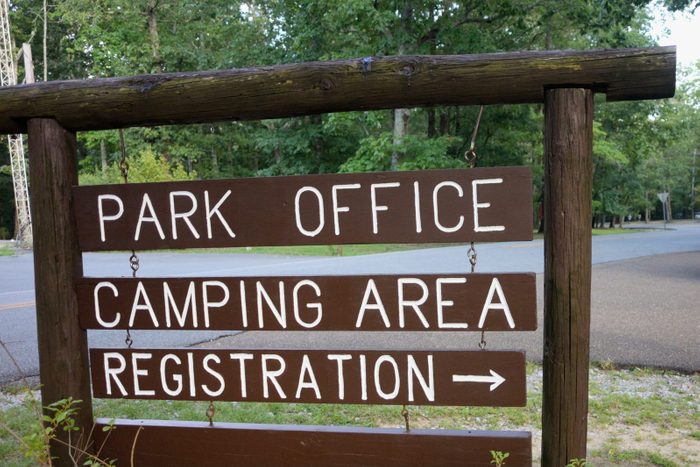
Arriving early
Showing up early can be a good etiquette move in a number of situations, but not when it comes to arriving at your campsite. Longtime camper Minnie Ruiz, who mostly camps at large, family-friendly group campgrounds and state parks in Wisconsin, says that on several occasions, she’s seen families arrive at her campsite several hours before their reservation. While she’s still there packing up her belongings, they keep an eye on her, which makes her feel rushed.
Do this instead: Instead of showing up hours early in hopes of being able to set up early, call your campground to see if they have an open site available. If they don’t, ask for a suggested hike, swim or other camping activity nearby that might help you while away the time.
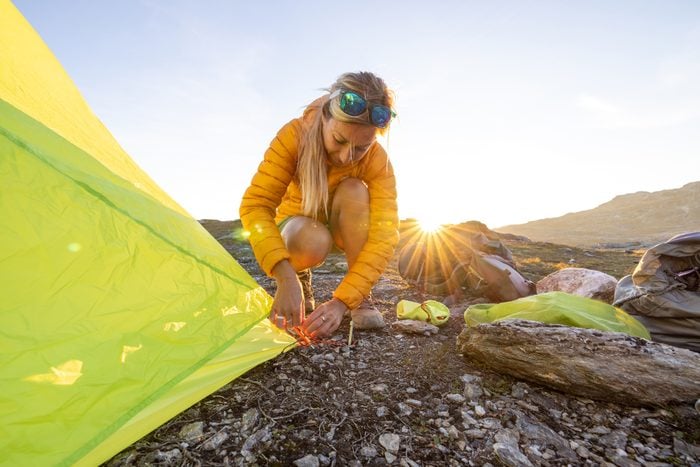
Setting up outside the campground
If the campground is getting crowded, you may think it would be polite to set up your tent outside the defined campground area in order to give everyone a bit more space and privacy. Chee Liu, who mostly does backcountry and wilderness camping in and around New Jersey, New York and Pennsylvania, says setting up outside the approved zone is a bad idea for a number of reasons. For one, straying too far from the designated campsite could make it more difficult (and potentially dangerous) to walk to the shared bathroom facility in the middle of the night. In some cases, you also run the risk of camping on private land, if the campsite borders private property. Plus, you could damage sensitive plants.
Do this instead: If your fellow campers haven’t yet set up their tents, you may be able to work with them on the best configuration to allow maximum space for everyone. Better yet, plan your camping trip for weekdays during off-peak season, when campsites tend to be less crowded.
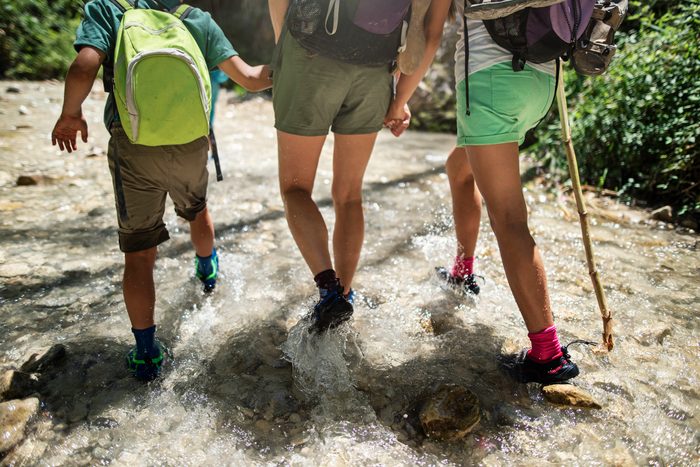
Hiking off the trail
Hiking is a very popular (and fun!) activity to do while camping, and if you’re at a beloved state or national park, odds are that the trails will be crowded. Just like some campers may think it’s polite to set up their tent outside the proper campground, some hikers may also think it’s polite to hike off the trail to free up space on the main trail. Just like with poorly placed tents, however, doing so can damage sensitive flora. Hiking off-trail also means you run the risk of getting lost.
Do this instead: Always stay on the trail. If a trail is crowded and someone needs to pass, move to the side of the path, but don’t forge your own trail. To avoid crowds in the first place, head out very early, seek out less-popular trails or hike during weekdays and off-peak seasons.

Letting dogs run free
Many campgrounds and campsites, including some campsites in National Parks, allow pets, which can be awesome bonding for you and your pup. Dogs can be the best company, after all, and they like the outdoors as much as, if not more than, we do. But just because dogs are allowed doesn’t mean they can—or should—be given free roam; most campsites have specific rules pet parents need to follow, and there is your pup’s safety to consider too.
I often camp in the Adirondack Mountains in upstate New York, where dogs are required to be leashed (and where they aren’t allowed on some trails), yet, on several occasions, I’ve seen dogs running wild at campsites. Not only is this prohibited by the park, but it’s also thoughtless, because not everybody likes dogs, even if they are “friendly.” Personally, I’m not a big dog person, so unless it’s my family’s rescued pitbull, I don’t appreciate having dogs jumping on me and trying to kiss me. It’s not polite to other dog owners, either, as it’s not uncommon for otherwise normally well-behaved dogs that are on a leash to react aggressively to a dog that is not.
Do this instead: Confirm in advance if dogs are allowed at your campsite and what rules need to be followed, including when and where dogs need to be leashed. If you’re ever in doubt once at the campsite, err on the side of caution and keep your pup on a lead.
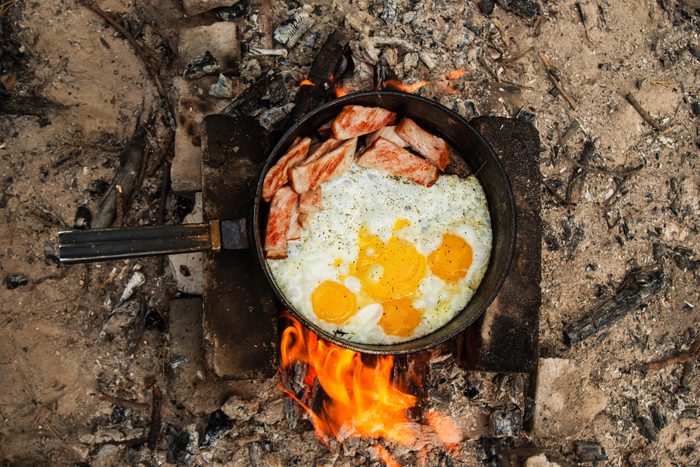
Leaving food out
Did you prepare a huge, delicious lunch for the group but they haven’t made it back from their hike yet? Wouldn’t it be nice if you just left the food out for them while you head off for a quick swim? No, it wouldn’t! Not only will leaving food out potentially attract birds, squirrels, raccoons, bugs and other annoying pests, but if you’re in bear country, this could be extremely dangerous if you attract the wrong type of guest. Not to mention that on a hot day, you’re also inviting food poisoning.
Do this instead: Never leave food unattended, particularly in bear country, where you may need to bring your own bear canister. If needed, coordinate schedules with your group to ensure everyone is there to eat at the same time, but if you need to leave the campsite for any reason, clean up and properly store all your food first.

Spraying bug spray
If you’re outdoors, odds are that mosquitos, ticks and other bugs will be around, particularly if it’s summer and you’re near a swampy area. But even the best bug spray and mosquito repellents can be misused. Bug sprays are highly flammable, and even if you keep your distance from the campfire, the smell can be overpowering to other campers, particularly those with allergies or sensitivities to strong smells and chemicals.
Do this instead: Consider spraying your clothing, tent and materials before arriving at the campsite. If you need to apply or reapply while camping, stay away from the fire and as far as possible from other campers. Also, only spray as much as needed.
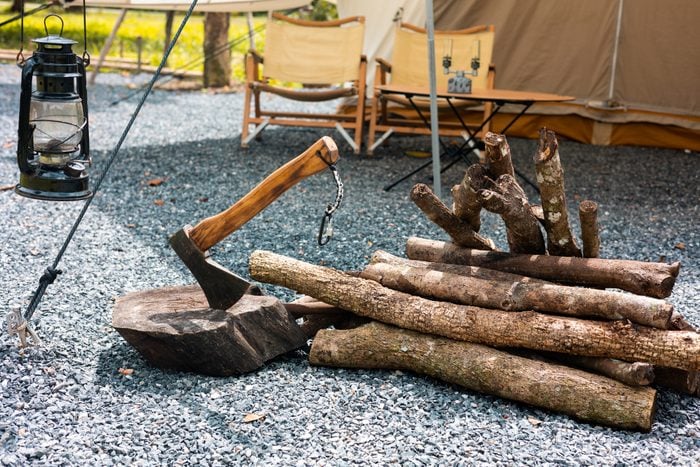
Chopping down trees for firewood
Chopping down a tree is hard work, so some well-intentioned campers may think they’re doing fellow campers a favor by chopping down some small trees and branches for firewood. Not only is it illegal to chop down trees—living or dead—in nearly every outdoor setting imaginable, but it’s also just bad form. If you chop down a live tree, you may kill it, meaning that other humans and animals won’t be able to use or benefit from it in the future. Even chopping down a dead tree is problematic because its trunk and branches may have been home to birds and other wildlife.
Do this instead: If you didn’t bring your own firewood (more on that below), use only wood that you’ve gathered from the forest floor, meaning dead wood that has already died and fallen—nothing fresh and living.
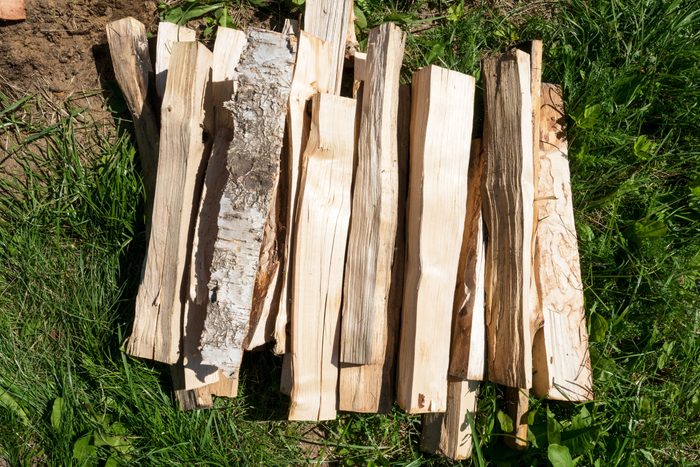
Bringing your own firewood
Some might consider it convenient and thoughtful to pack firewood from their own backyard or fireplace to save the group from having to search for it, but this is a big no-no, and in some cases, it’s even illegal. Why? Because transporting firewood from one place to another also potentially transports any fungi, bacteria and highly invasive species that might be living on that wood. These insects and species can wreak havoc on the ecosystem and threaten the biodiversity of their new environment. This is especially true when traveling long distances and across state lines, but it also applies to short camping trips within your state. According to The Nature Conservancy’s Don’t Move Firewood campaign, it’s best to avoid moving firewood more than 10 miles. (Check out their interactive Firewood Map to learn about local regulations across the U.S. and Canada.)
Do this instead: Most campsites sell bundled firewood, but call in advance to confirm. Or, once you arrive at the campground, ask at the park ranger’s office or information station where you can buy firewood.
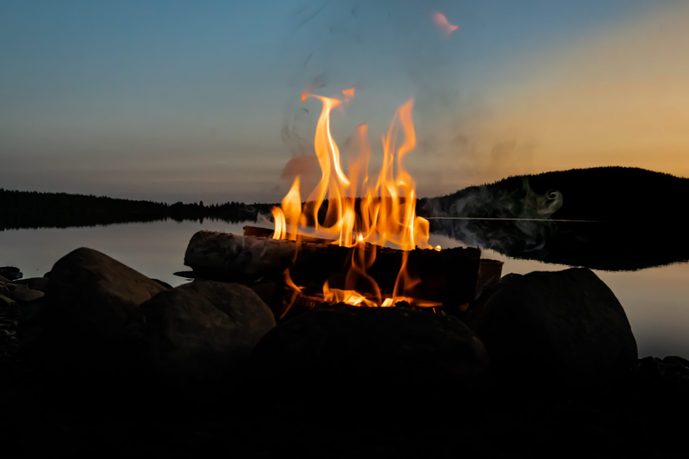
Leaving the campfire burning
It can take up to an hour to get a good fire going, so you might think that once your crew is finished telling campfire stories and is headed to bed for the night, it’s a kindness to leave the fire roaring. Other campers might enjoy it, right? Wrong. Not only is this impolite, it’s extremely dangerous. If you’re going to sleep (or out for a hike), it’s essential that you fully extinguish your fire first.
Do this instead: Fully extinguish a campfire after every use, says Mark Lemoine, the owner of the Coloma/St. Joseph KOA Holiday Campground in Michigan. To do this, first let the wood burn completely to ash, then pour lots of water on the fire to drown all the embers, not just the red ones. You’ll know it’s out once the hissing sound stops. In addition, Lemoine notes, it’s essential to never leave your fire unattended and only build fires in designated, fire-approved areas. If there isn’t already an established fire pit, it’s very possibly because fires aren’t allowed in that area, so save the s’mores fixings for another time.
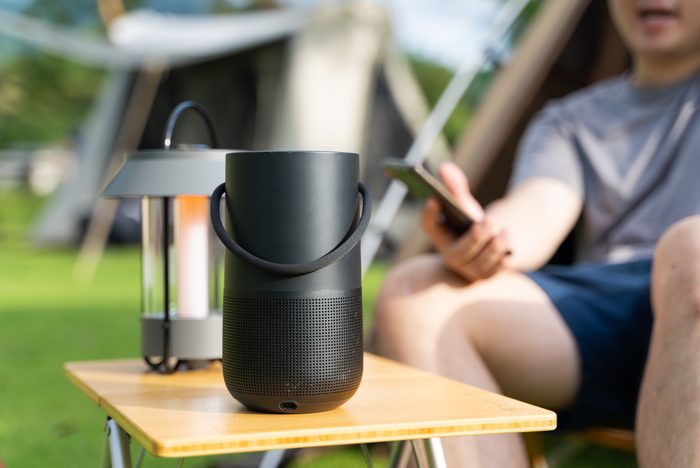
Playing music
We get it, some people love playing music while camping, since it can set a festive party atmosphere or a smooth and laid-back mood. However, don’t assume that those around you want to listen to music at all, and even if they do, that they have the same taste in tunes that you do—not everyone is a fan of popular camp songs. Some campers who may love listening to music at home or in their cars may intentionally leave their radio and speakers at home because they want to hear the wind, birds and crackling fire that might be drowned out by loud music.
Do this instead: If you want to play music, pack a speaker, but know you may not get to use it. Ask neighboring campers if they mind if you play some music, and if they don’t, make sure they know to tell you if it gets too loud. If your neighbors don’t want to hear your music, or if you want to listen late at night inside your tent, bring along a set of headphones.
Read on to learn some camping tips and mistakes every camper should avoid.
